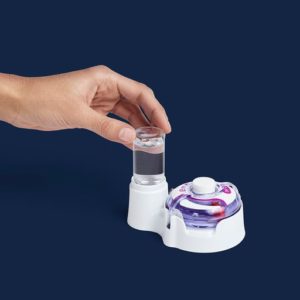
Large-Volume Wearable Drug Delivery Technology Is Clinically Proven
Opening Summary
Does large-volume wearable drug delivery technology really work? And is it clinically proven? Experts addressed these questions and more in a recent webinar. Read on to learn more and access the full webinar discussion below. Re-cap:
- Emerging wearable technology enables flexibility of delivery volumes from 5 to 50 mL
- Large-volume SC delivery technology brings care closer to the patient
- Convenience in care is important to patients
Does large-volume wearable technology for subcutaneous (SC) delivery work? Yes. Emerging innovative technology enables large-volume delivery and this innovation is clinically proven to work.

Mike Hooven, President and CEO, Enable Injections
Mike Hooven: Yes, but current technologies delivering volumes greater than 10 mL are complicated, bulky, and non-wearable.
As a delivery technology innovator, Enable Injections recognized the only way to deliver high volumes in a wearable technology is to design with simplicity. For the enFuse, a silicone tube acts as both the drug container and the power supply. This design enables the most efficient size for its delivery volume, allowing flexibility of a range from 5 to 50 mL.
enFuse’s unique elastomeric technology delivers therapeutic at a low pressure. From early clinical data, we have relative confidence that this low-pressure injection, which is responsive to the pressure in the subcutaneous tissue, translates to resulting clinical benefits. We’ve built and tested more than 100,000 enFuse units, executed 4 clinical studies, and have several upcoming studies. Our preliminary data show:
- Overwhelming patient preference
- A high degree of comfort
- Reduced adverse events
- Improved dose accuracy

Dr. Len Lichtenfeld, Chief Medical Officer, Jasper Health
Why would a physician benefit from large-volume subcutaneous delivery technology? It allows you to start taking the care closer to the patient.
Dr. Len Lichtenfeld: There’s no reason you can’t have a more efficient effective system within a clinic. This allows you to start taking the care closer to the patient. It benefits the clinician, reduces the stress on the system, and opens up options for the people who are coordinating the care, the people who are paying for the care, and most importantly, the people who are receiving the care.
What criteria should I have when selecting technology? Select a delivery system that has 1) a high level of confidence, 2) is simple, and 3) utilizes a good plan.

Jim Collins, Drug Delivery Device Expert
Jim Collins: Why should pharma companies be interested and how do they go about making these decisions? There are three key points:
- High level of confidence. It’s very important to select delivery systems that have a high probability of success with the molecule.
- Simplicity always wins. You want to pick the system that is simplest to use.
- A good plan is essential. A molecule paired with a new delivery technology has a higher chance for success with a good plan in place.
Why would a large-volume SC delivery technology be beneficial for the patient? The convenience aspect, or being able to provide an overall time savings to the patient, is most important.

Elizabeth Shaheen, Biopharma Strategist
Elizabeth Shaheen: In a 488-patient preference study which looked at SC trastuzumab, 90% of patients preferred SC administration over IV. 80% explained time savings was the greatest benefit. If you look at the prior HannaH study with SC trastuzumab, the duration of subcutaneous injections was only one to five minutes versus 30 to 90 minutes for the patient to receive an IV. You see an even greater benefit where a 3,4,7-hour infusion is minimized to a 5-minute injection. That patient is also having to travel to the IV clinic, so time-savings extends to the commute for patients and caregivers.
Closing Summary – Webinar Access
enFuse technology is not only simple, but also feasible.
Read more from our first in this series. Access the full webinar content here: At-Home Drug Delivery of Large Molecule Medicines. To learn more about partnering with Enable Injections and our innovative enFuse®, contact us.
